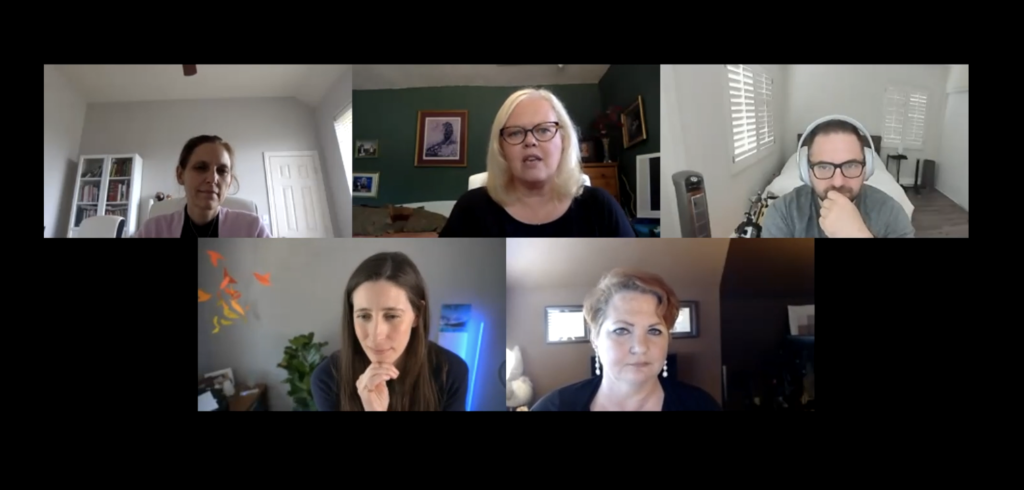As cloud computing continues to grow, there is a significant shortage of talent in the sector. So those with an interest in the technology who are willing to learn should consider entering the field — even if they don’t have any skills yet, according to cloud computing experts who spoke during the recent “Connections Corner” webinar “Skill Up on Cloud Computing” that was hosted by Women in Technology Hollywood (WiTH).
The trio of cloud computing experts from the major cloud computing providers discussed how to “skill up” in this high-profile area.
Dr. Jose Cross, client executive of AT&T IA cloud and strategic initiatives with IBM, entered the cloud computing sector through the telecom industry’s “move towards virtualized environments and then evolving from virtualized environments to private cloud and then from private cloud to public cloud,” she explained.
It was an “evolution at least 10 years in the making” as telecom providers have been “looking at lowering their technology footprint and decreasing their unit costs,” according to Cross, who has 20-plus years of experience helping clients successfully solve complex business problems in the most cost-effective way, applying technology leadership and innovative thinking.
 Meanwhile, Tiffany Powell, head of learning community and outreach for Google Cloud, entered the cloud computing and technology sector in a way that was “totally accidental” and stemmed from her “passion for helping people,” she recalled. Powell brings a couple decades experience in tech education, and has split her time between some of the biggest tech heavy hitters and startups.
Meanwhile, Tiffany Powell, head of learning community and outreach for Google Cloud, entered the cloud computing and technology sector in a way that was “totally accidental” and stemmed from her “passion for helping people,” she recalled. Powell brings a couple decades experience in tech education, and has split her time between some of the biggest tech heavy hitters and startups.
“Technology is an enabler across everything,” she said, adding: “Squarely we’re in the fourth industrial revolution right now so you cannot miss heading into the cloud … . Everyone is moving into this world of connected information” and “we’re the foundation of how the future is changing today.”
Eliot Sakhartov, business and technology strategist for media and entertainment at Microsoft, described himself as an “on-prem guy” who wound up in the cloud computing sector. He has more than 20 years of professional technology experience in media and entertainment.
The importance of the cloud
“Because technology is changing so rapidly [and] things are really evolving so quickly, we tend to find a lot of applications that were developed a while back suddenly become end of life, and software becomes end of life,” according to Cross.
There is a “need to keep up and eventually most businesses eventually let the long tail stay where it is and then try and focus on the more strategic pieces of software and applications,” Cross noted, adding: “What we find then is the long tail becomes technical debt and you just can’t get rid of that technical debt. So what cloud computing does [is] it enables the ability to get rid of that – to move all of those old systems onto something that” you don’t have to worry about anymore.
Powell pointed to the important role that the cloud plays in all our lives now. After all, she noted, the mobile communications we engage in with our smartphones is enabled by cloud infrastructure. “As a human being, we use it every day and don’t think about it,” she said. But, “as an organization, you have to think about it every day to make sure that you’re moving forward.”
The need for talent
Moderator Iseabail Lane, WiTH board member and director of application development and enterprise data at vitamin and dietary supplements company Pharmavite, noted there is still a need to “demystify” cloud computing and get some people “out of the on-prem closet, so to speak.”
The way to achieve that is with education and there is an urgent need to inform more people about the cloud computing and technology field and convince some of them to enter it, according to the panelists.
Powell made a prediction: The groups that invest in talent acquisition and growth and opportunities in the cloud ecosystem “will be the groups that are able to tap into success faster and maybe at bigger scale.” From Google’s perspective, there is a “strong sense of urgency to unlock the potential of people who want to come into cloud to give them paths to success, to help them make sense of” the cloud, she said. The company is looking for new talent who are early in their career who “may be tech-adjacent,” if not necessarily tech experts, she noted.
 Agreeing with Powell, Cross said: “The key driver of success into the future is developing talent into this new skill area so it really is a case of really being pro-active in engaging” new talent and offering free programs teaching cloud computing. “All tech companies are able to provide these types of training and educating and really skilling up people to really embrace this new cloud digital transformation that’s going on,” she noted. But she conceded that “it can be overwhelming” for people to pick the correct path.
Agreeing with Powell, Cross said: “The key driver of success into the future is developing talent into this new skill area so it really is a case of really being pro-active in engaging” new talent and offering free programs teaching cloud computing. “All tech companies are able to provide these types of training and educating and really skilling up people to really embrace this new cloud digital transformation that’s going on,” she noted. But she conceded that “it can be overwhelming” for people to pick the correct path.
“There’s a general shortage of talent” in the cloud sector, according to Sakhartov. Providing just one area as an example, he noted: “In 2020, there were 3.9 million jobs available for project managers.” That is significant but is “far outstripped by software developer” positions, he said, pointing out: “There’s 22.7 million software developer jobs, 17.8 million in sales.”
There are free education tools online to give people skills, he noted, adding: “We’re all looking to grow talent – either early career or late career, it doesn’t really matter. We want people.”
“Digital transformation project management,” in particular, presents a “huge opportunity right now for cloud programs and cloud projects,” according to Cross.
Certification programs can “100 percent” be helpful to newcomers, Powell said. Companies are “hungry for talent” and “what we look for is someone who’s a learner,” she noted. But she conceded that “we see job descriptions and we all get a little gun shy” because of the large list of requirements included in many job listings. However, “the reality is requirements are often not met” for many such positions, she said.
Powell’s suggestion: “Show up with the skill set you have and show us what you’re doing to grow yourself in those areas you don’t know and that’s equally valuable.”
Security is important because “we cannot function if we do not have the trust of the ecosystem,” Powell also said. “The minute we all just fall apart is the minute nobody trusts the cloud anymore,” she warned.
“At Google, we’re really heavy on” artificial intelligence and machine learning, Powell also said. “People who are entering that space” in particular “are pure gold,” she said, adding: “We cannot build and keep talent fast enough in that space.”
For those who may want to get into the cloud computing and tech sector on the ground level with no tech background, the panelists noted there are several options.
At Google, “we’re about to launch something called the Digital Leap Years certification and it includes a whole learning path,” Powell said, noting the goal is to “grow talent in the ecosystem.” That program would bring newcomers “to the table with some starter points” when they start looking for a job in the field, she pointed out, adding: “If you want to” enter the field and “help make change, we’re hungry for you, so look at it and figure it out and make a start because there’s probably a home for you.”
 Meanwhile, “there’s a lot of graduate programs that would take interns” who could potentially become employees at IBM, Cross said, adding: “There’s just a wealth of opportunities to come in through” universities and programs like that, as well as high schools. But it is important to have the desire to enter the field first, she said.
Meanwhile, “there’s a lot of graduate programs that would take interns” who could potentially become employees at IBM, Cross said, adding: “There’s just a wealth of opportunities to come in through” universities and programs like that, as well as high schools. But it is important to have the desire to enter the field first, she said.
“It doesn’t necessarily matter what you’re in school for,” according to Sakhartov, who said even a liberal arts major could be fine because there is a creative aspect to that and there are, as just one example, writers needed at tech companies.
“There’s so many ways to get into this field,” he said, adding: “It’s all about the desire” and if you want to learn. Tech companies will help. “But you have to want it,” he said.
Summing it all up
Summing up the session’s highlights, Lane said it’s a “natural evolution” from on-prem to the cloud. On-prem and the cloud will continue to co-exist to some degree, she predicted.
There is a shortage of talent and tech companies are looking for people who want to learn and expand their skills and having the aptitude and interest is fine if you do not have the skills, she said.
Recalling a scene in the film On Golden Pond in which actress Katharine Hepburn’s character caught Jane Fonda’s character practicing back flips into the title pond, Lane quoted Hepburn’s line, urging people to not “get soggy” and keep on learning new skills.
Click here to view the webinar.

